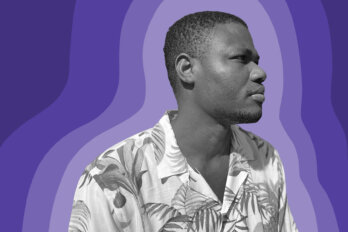Prediction is not only possible,
it’s paramount. Milestones
make us human. Upright,
time-bound. Or is that poetry,
or is that music. Or is that sports,
or breweries. Or pharmaceuticals,
or suicide. Or none of the above?
Before you can hold your waterlogged
head up in a cobra pose,
these mental Likert checkboxes of Norms
hover over your tiny bed
like mobile elements, like the stars
you’ve yet to witness.
Surveillance dovetails with a kind of love
we call unconditional,
in a manner too expansive for the present
discussion. In its absence,
like water, you may cycle through three states
of identity—moratorium,
diffusion, foreclosure—
It’s not your fault no one taught you awe
or boundaries.
But it’s hard to reach the eudaimonic
without a map,
sea-legs, a second-language, etc. It’s not
impossible, per se,
but it’s difficult—actually changing, post-ideal
window of acquisition.
It’s somewhat unheard of. Unusual. Abnormal,
even.
This appeared in the September 2016 issue.





